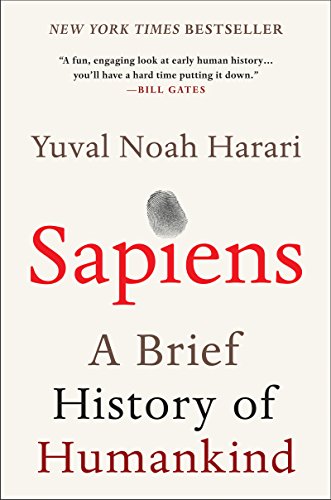

This article is an excerpt from the Shortform summary of "Sapiens: A Brief History of Humankind" by Yuval Noah Harari. Shortform has the world's best summaries of books you should be reading.
Like this article? Sign up for a free trial here .
What is humanism? What are the different types of humanism philosophies? Do humanist beliefs require a God?
Humanism is the term for religions or belief systems that worship man rather than God or gods. This doesn’t mean that humanists don’t believe in God. There are four general types of humanism: liberal humanism, socialist humanism, and evolutionary humanism.
We’ll cover how these three types of humanistic beliefs differ from one another, humanism meaning, and what the future of humanism looks like.
What Is Humanism?
Humanist meaning: Humanist religions worship Homo sapiens rather than God or gods. They believe that man is special and that his sacredness distinguishes him from plants and other animals. Other species exist only for the benefit of Sapiens and the sacredness of man is the most important aspect of the universe.
Humanistic beliefs have shaped our world. Let’s look at what humanism philiosophies teach. There are three basic types of humanism:
Types of Humanism
1) Liberal Humanism
The first type of humanism philosophy is Liberal humanism. Liberal humanists believe that the sacredness of humanity lives in every individual. Therefore, the most important thing is to protect each individual’s sacredness and freedom. This is where our modern idea of “human rights” comes from. For instance, because liberal humanists believe in the sanctity of every individual, they object to the death penalty. They’d rather put murderers in prison and help them rediscover their sanctity than kill them.
2) Socialist Humanism
The second type of humanism philosophy is socialist humanism. Social humanists believe that the sacredness of humanity lives in the collective, the Sapiens species as a whole. The most important thing is to protect the equality of individuals in the species (rather than the individual freedom favored by liberal humanists). Inequality denies our sanctity because it privileges unimportant qualities like wealth or skin color. When we favor the rich over the poor, for example, it shows that we value money over the sanctity possessed by all humans, regardless of their net worth.
3) Evolutionary Humanism
The third type of humanism is evolutionary humanism. Evolutionary humanists believe that we need to actively direct the evolution of our species, making sure we evolve into superhumans rather than subhumans.
Naziism is the most famous form of evolutionary humanism. The Nazis believed that the Aryan race was the most advanced form of Sapiens, and that interbreeding with lower forms like Jews, homosexuals, and the mentally ill would pollute the superior race and lead us toward devolution into subhumans. Their goal was to assist natural selection in the development of a superhuman race.
Evolutionary humanism was a surprisingly common religion in the West. Western politicians believed it was their duty to keep their countries pure and white by limiting immigration from places like China and even Italy. World War II caused Hitler’s enemies in the West to finally disavow the racism that was actually pretty common in their countries.
The Future of Humanism
What is humanism? It’s the worship of man rather than God (although the belief in God is often necessary to rationalize humanist beliefs).
We live in social orders based on humanist principles, even though science increasingly shows that our behavior is determined not by souls and free will but by DNA and hormones. These are the same elements that determine the actions of chimpanzees and ants, meaning we’re not so special after all. But as long as our imagined social orders are founded on humanist principles, we’ll probably continue to believe in our inherent superiority.
Is Humanism a Religion?
We might think of humanism as a philosophy, but it’s also a religion. Let’s look first at the definition and requirements that make a belief system a religion, and then we’ll look at the additional requirements that give particular religions their unifying function.
To be a religion, a system has to meet two requirements:
- The system has to be predicated on the belief in a “superhuman” order. As used here, “superhuman” is defined as “not the product of human actions.” For instance, professional soccer shares a lot in common with religion: it contains rituals, rites, and laws. But because these rituals and laws are determined by humans (in this case, FIFA), professional soccer isn’t a religion.
- The system must establish norms and values, like modesty in dress or showing compassion. Many people believe in ghosts, but these beliefs don’t give us moral standards to meet, so they don’t constitute a religion.
Humanist beliefs meet both these requirements. The religions that revolutionized the world and led us toward a more global empire have two more requirements.
- The system must be universal. Believers must believe that their system is true everywhere and applicable to everyone. Below, we’ll look at how local religions like animism gave way to universal religions like Christianity.
- The system must be missionary. Believers must be fanatical about spreading the universal truth of their system to everyone on earth.
Humanist beliefs also meet these requirements. Religions that are both universal and missionary appear relatively recently in history. These religions have the power to bolster our imagined social orders and unify humanity on a grand scale.
A system need only meet two criteria to be a religion: it needs to be based on the belief in a superhuman order and it needs to establish norms and values. By this definition, there are many other religions, some we don’t normally think of as religions, such as capitalism, Communism, and Nazism.
Further, these religions meet the 3rd and 4th criteria that give a system power to legitimize political orders and change history. These religions are both universal and missionary.
For instance, like Buddhism, Communism is a religion based on natural laws. In the case of Communism, these laws were discovered not by the Buddha but by Marx, Engles, and Lenin. Communism’s holy book is Marx’s Das Kapital and its holidays are the First of May and November 7th, the anniversary of the October Revolution. Devout Communists have been expected to give up faith in other religions, such as Christianity, and spread the gospel of Marx and Lenin. When viewed this way, Communism is a religion just as much as Buddhism or Christianity are.
———End of Preview———

Like what you just read? Read the rest of the world's best summary of "Sapiens" at Shortform . Learn the book's critical concepts in 20 minutes or less .
Here's what you'll find in our full Sapiens summary :
- How Sapiens outlived and outlasted the 8+ other human-like species on Earth
- The 3 critical revolutions in human existence that led to our domination of the planet
- How much of what powers our world today is really just a shared mass delusion
- What the future of humanity might look like






